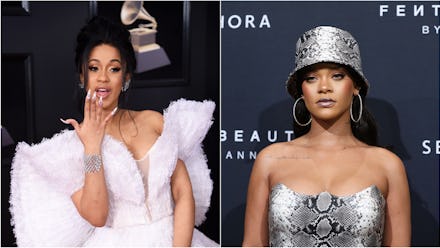Rihanna's and Cardi B's global gaffes prove celebrities are far from diplomats

Two of the world’s biggest superstars made gaffes that angered their international fans recently. Cardi B promoted a pro-Armenia fundraiser on her Instagram at the behest of a friend, not realizing the country's at war with Azerbaijan. Her post spawned the hashtag #CardiBSupportsTerrorism and she's been struggling to distance herself from the conflict ever since.
Rihanna, meanwhile, apologized to the Muslim community for using a song in her latest Savage X Fenty fashion show that sampled the Hadith, a sacred religious text. Both controversies boil down to ignorance on the stars’ behalf, not malice towards any particular group of people. But they also highlight how celebrities can be unwitting diplomats in the digital age, demanding more from entertainers than they may be equipped to handle.
Let's dissect the accusations of terrorism first: This week, Cardi B shared a flyer for a virtual fundraiser benefiting Armenia with her 76 million Instagram followers. What she didn’t know is there’s a war raging in the region over the breakaway enclave of Nagorno-Karabakh, which is technically in Azerbaijan but has a majority-Armenian population. The conflict has killed at least 250 people so far, including civilians.
The rapper addressed the issue in a voice memo posted to Twitter, apologizing and explaining she’d agreed to promote the fundraiser at the behest of an acquaintance — without doing her research first. Cardi and her soon-to-be ex-husband Offset met with a real estate consultant to discuss selling property in Atlanta, and he allegedly asked for their help promoting “a good cause.”
“And we said: ‘Sure, why not?’ We love to support everybody,” Cardi B said in the recording. “And then I wake up and I see a lot of people from Azerbaijan writing me things, writing me stuff, and I did not know that this is a war between two countries.” The star said she’d be more diligent about vetting the causes she supports going forward. “It wasn’t in my place to post something, I should’ve done more research,” she admitted.
But Cardi B also kind of threw her hands up when she kept getting attacked after her apology. “I just want peace. I love peace. I want everybody to get along. I don’t want people dying. Nothing. Why do you keep harassing me if I keep apologizing for it? I don’t know. I don’t fucking know. Have a good night,” the rapper concluded.
Also this week, Rihanna apologized for using a song in her latest Savage X Fenty show that sampled sacred Muslim texts. People were upset that a Hadith about judgement day, believed to have been spoken by the Prophet Muhammad, was used to soundtrack the lingerie fashion show. Rihanna issued an apology, calling the use of the song "irresponsible" and an "honest, yet careless mistake." She promised more diligence going forward. Fenty has been praised for its diversity, but the incident belies a need for greater multiculturalism behind the scenes. Fenty fan and beauty blogger Hodhen Liaden told BBC's Radio 1 Newsbeat it was “refreshing” to see Rihanna’s apology, but added that brands "need more Muslim people in these industries that can pick up on things like this."
Famous people are arguably more involved in politics and social issues these days than ever before. “I really couldn’t want to be involved in politics less; I’d rather be doing literally anything else than talking about this,” Billie Eilish recently told Jimmy Fallon. But she acknowledged her influence: “Especially having the platform that I have, I don’t want to waste that. So I think it’s really important that we all talk and speak up, even if we’d rather die,” Eilish said.
When celebrities are able to beam information to millions of devoted global fans with the tap of a button, there’s also a lot more pressure not to cause an international crisis. "The boundaries of diplomacy are blurring in a way which is characteristic of the modern age," Raymond Cohen, Professor of International Relations at the Hebrew University of Jerusalem, told The Independent way back in 2009. "There is a crisis of legitimacy and in an odd way celebrities have become democratized — they speak for the common man. What they do is more than advocacy and they need some of the skills of a diplomat.” Of course, not many actors or musicians have degrees in international relations, meaning until stars surround themselves with an entourage of political and cultural consultants, these sorts of missteps are bound to happen.